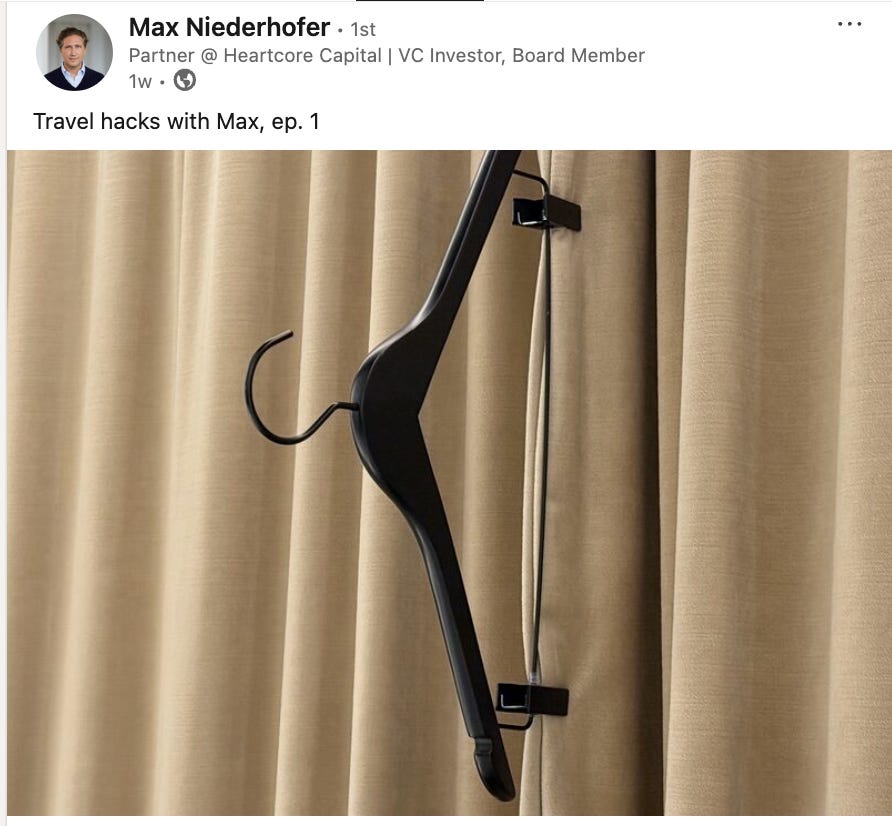Travel innovations create tension between what we expect and what we desire. In this issue, I explore some of these contrasts: between AI-driven efficiency and human touch, between traditional players and new innovators, between complex technology and simple solutions.
Merry Christmas and happy holidays to all of you. Thank you for being part of Travel Tech Essentialist in 2024, and my best wishes for 2025. May it bring success that truly matters.
Thanks to the Travel Tech Association for sponsoring this edition of the newsletter:
Recognizing the challenges faced by startups and SMBs, Travel Tech has expanded its Advocate membership to offer monthly webinars, networking, and access to the Innovation Policy Newsletter. In May 2025, join the Travel Tech Start-Up Summit in Washington, DC, followed by the Policy & Innovation Showcase. Discover how the Advocate program can help your business thrive.
1. Your votes on Travel Tech’s expected vs. desired future
Last month, I shared my 21 Ridiculously Specific Travel Tech Predictions for 2025, and you voted on which predictions you think will come true and which ones you want to come true. The results reveal an interesting tension between industry expectations and aspirations.
Creating “tourist-free zones” in major cities was the only one that ranked high for both likelihood (33%) and desirability (39%). Otherwise, what you expect vs. what you want tells an interesting story. The industry anticipates structural changes (power shift towards Asia, AI customer service) but desires human-centric innovations (empathy pricing, memorable experience guarantees, travel advisor marketplaces). For instance, while 31% believe AI will replace traditional customer service, only 13% want this to happen.
Go here for the full results and analysis.
2. The future of search and travel discovery
Speaking of predictions, let’s look at how we might actually find travel information in the future. Christian Watts suggests we’re heading toward a hybrid future combining three core formats: LLMs (for instant, accurate information), Google-style search (for credible third-party sources), and video platforms (for inspiration and how-tos). Each has its challenges. LLMs still occasionally hallucinate, Google feels increasingly labor-intensive (“why click multiple links?”), and video platforms like TikTok prioritize entertainment over accuracy. Christian says that the future is likely a merger of all three, with AI agents acting as personal information gatekeepers, filtering and presenting data in our preferred format. Read +.
3. Dumb questions
To reach intelligent answers, you often need to ask really dumb questions — Rory Sutherland
-
Why do we still have business class but not “family class” on planes?
-
Why do we still book flights by airports instead of actual destinations?
-
Why do hotels still have fixed check-in/out times?
-
Why can’t I subscribe to a hotel chain the way I subscribe to Netflix, for a certain number of nights per year?
-
Why do I need travel insurance for each trip instead of having an annual plan like home or car insurance?
-
Why do rental car companies penalize me for one-way trips when it might actually help redistribute their fleet?
What “dumb” questions are you asking?
4. In glamping, French & Wolff might know better than Marriott & Hyatt
Marriott just bought Postcard Cabins (formerly Getaway), the first time a major hotel chain has actually acquired a glamping company rather than just partnering with one. Nick Purslow, founder & CEO of Posh Outdoors, wonders if Marriott really gets what makes glamping work. The old hotel playbook might not cut it anymore. In glamping, having a big brand name doesn’t matter as much as creating amazing experiences and Instagram-worthy spots. The big hotel chains might need to do more listening than teaching if they want to succeed in this space. Read +.
If I had to bet on someone to create a world-class, experiential destination, I’d choose the likes of Isaac French, Ben Wolff, Blake Smith and Irene Wood over a chain hotel developer every day of the week. — Nick Purslow
5. YC’s winter 2025 priorities
Y Combinator released their Winter 2025 request for startups. Their priorities:
-
Government software (using AI to make it actually work)
-
US manufacturing (following Tesla’s lead)
-
Public safety tech (like the license plate cameras already solving 10% of US crimes and aiming to get to 25% of all crime by next year)
-
Space companies (it’s not about rockets. It’s about what happens when launching satellites becomes as routine as shipping containers)
-
Stablecoins (building infrastructure for banks and businesses)
-
AI for chip design
-
Next-gen fintech (built on new infrastructure like Stripe)
-
AI-powered engineering tools (making PhD-level tools accessible to regular engineers, government workers, and small business owners)
-
Startups that could create “one million jobs” that uniquely need humans, not AI.
Some massive opportunities emerge from this: the massive deficit creates an enormous inflection point for government software startups (there’s more pressure than ever to cut costs); US manufacturing is becoming strategic again just as robot costs are falling; and while most are focused on consumer AI, government agencies might be the trillion-dollar customer nobody’s paying attention to.
6. a16z’s 50 big ideas in tech
a16z asked 50 partners to share their biggest ideas in tech for 2025. Here are some highlights:
-
Consumer apps moving from AI collecting data to “AI-in-action”
-
“AI brain” revolution where AI can understand your preferences and past behavior
-
Customer service shifting to “AI + human verification” rather than traditional support models
-
Instead of AI replacing workers, they see AI helping small businesses compete with big corporations
-
AI could help make government services actually work by automating paperwork and bureaucracy
-
Every white-collar worker might get an AI copilot to handle routine tasks
7. Quantum computing’s promise for travel
First, some context: Quantum computing uses quantum mechanics principles to perform complex calculations, allowing for exponentially greater processing power than classical computers. For travel, it could bring new solutions to challenges like optimizing flight routes, instant rebooking during disruptions, improving weather predictions, or enhancing security measures.
A (somewhat dense) UK Department for Transport report predicts quantum technologies could generate up to £8 billion in value for the UK transportation sector by 2035. Applications range from reducing congestion costs (£2.8 billion annually through quantum-powered traffic management) to enhancing cybersecurity. Quantum sensing technologies could be commercially viable within five years, enabling better underground mapping and autonomous navigation in GPS-denied environments.
8. Rage and revenge is a powerful entrepreneurial driver
9. No AI needed
Great first episode. I want more!

10. Deplaning like adults for a change
Deplaning can be chaotic, with passengers dealing with tight connections, walking back for luggage, and crowding the aisle. While airlines have improved boarding efficiency, getting off the plane remains unstructured. Some carriers, like Spain’s Vueling, have introduced row-by-row deplaning, but it’s still a free-for-all in most airlines. Simple habits, like letting rows ahead exit first or packing up quickly, can make the process easier for everyone. Read + WSJ.
2025 Travel Tech Essentialist Newsletter Sponsorship Opportunities
Reach a focused audience of travel tech professionals by sponsoring the Travel Tech Essentialist newsletter. If you’re interested, please complete this form to learn more.
Are you fundraising?
If you are a startup looking to raise a round (from pre-seed to Series D), I can help (for free). Travel Investor Network is a private platform where I recommend innovative travel startups to investors and innovators. If you’re interested, please start by completing this form.
Travel Tech Essentialist Job Board
→ Explore 1046 Open Positions on the Travel Tech Essentialist Job Board
-
Airalo | Senior Data Analyst | Remote
-
Despegar | Sr Global Partners (in Spanish) | Cancun
-
Flight Centre Travel Group | Marketing Specialist | New York
-
TravelPerk | Web Strategy Consultant | London
📩 For monthly updates on the latest roles, subscribe to the Travel Tech Jobs newsletter
💼 Employers: If you want to list your jobs here, complete this quick form
If you like Travel Tech Essentialist, please consider sharing it with your friends or colleagues. If you’re not yet subscribed, join us here:
And, as always, thanks for trusting me with your inbox.
Mauricio Prieto








